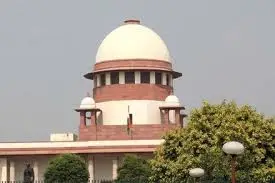Supreme Court Collegium recommends elevation of Karnataka HC Chief Justice Anjaria, Gauhati HC Chief Justice Bishnoi, Bombay HC judge Chandurkar

The Supreme Court Collegium has recently recommended the elevation of three distinguished judges to the Supreme Court of India. These judges include Justice N.V. Anjaria, the Chief Justice of Karnataka High Court; Justice Vijay Bishnoi, Chief Justice of the Gauhati High Court; and Justice A.S. Chandurkar, a judge from the Bombay High Court. This move is significant as it aims to fill key vacancies in the apex court and uphold the quality of judicial leadership.
Understanding the Collegium System
India’s Collegium system plays a vital role in appointing judges to the higher judiciary. Established through important Supreme Court rulings, it involves the Chief Justice of India along with the four senior-most Supreme Court judges. They collectively decide appointments and transfers based on merit, integrity, and seniority. This system helps maintain judicial independence by reducing political interference in these sensitive decisions.
About the Recommended Judges
Justice N.V. Anjaria
Justice Nilay Vipinchandra Anjaria has built a respected judicial career since his appointment to the Gujarat High Court in 2011. After years of diligent service, he became Chief Justice of the Karnataka High Court in February 2024. His experience in one of India’s busiest courts adds significant value. Moreover, his judgments reflect fairness and a deep understanding of legal principles.
Justice Vijay Bishnoi
Currently serving as Chief Justice of the Gauhati High Court, Justice Vijay Bishnoi took office in early 2024. Before this, he was a judge at the Rajasthan High Court. He is well-regarded for his precise and thoughtful handling of constitutional cases. Importantly, his appointment would bring better representation from India’s Northeast region, enriching the Supreme Court’s diversity.
Justice A.S. Chandurkar
Justice A.S. Chandurkar is a sitting judge at the Bombay High Court. Although less publicized, his tenure reflects professionalism and sound judgment. Given that Bombay High Court handles complex commercial matters, he has gathered vast experience. The collegium’s recommendation indicates trust in his ability to contribute meaningfully to the Supreme Court’s work.
Why These Elevations Are Important
The Supreme Court must maintain its full strength to ensure swift justice. Recent retirements, including former Chief Justice Sanjiv Khanna and Justices Bela M. Trivedi and A.S. Oka, have created vacancies. Filling these is crucial to avoid delays in hearing cases. Thus, the collegium’s move to elevate these judges is timely and necessary.
Additionally, the appointments reflect a balance between seniority, merit, and geographic representation. This balance helps the Supreme Court function effectively while representing India’s diverse regions and legal traditions.
Broader Impact on the Judiciary
These elevations send a strong message about judicial independence and meritocracy. They reaffirm the collegium’s commitment to selecting judges who have shown integrity and capability. Furthermore, by including judges from Karnataka, Gauhati, and Bombay High Courts, the collegium promotes regional diversity on the bench.
Such diversity is vital because India’s judiciary must address a wide range of issues affecting different states and communities. The inclusion of judges with varied experiences will enrich the Supreme Court’s perspectives on legal and social matters.
Next Steps in the Appointment Process
After the collegium recommends candidates, the President of India formally approves the appointments. Following this, the judges take the oath of office and begin their tenure at the Supreme Court. This process involves careful scrutiny and consultation to ensure only the most qualified individuals are elevated.
Once sworn in, these judges will face the responsibility of deciding some of the most critical legal issues in the country. Their decisions will impact constitutional law, civil rights, commercial disputes, and administrative matters.
Conclusion
The Supreme Court Collegium’s recommendation to elevate Justice N.V. Anjaria, Justice Vijay Bishnoi, and Justice A.S. Chandurkar is a welcome step. It addresses urgent vacancies and strengthens the judiciary’s capacity to deliver timely justice. Moreover, it reinforces the importance of merit and regional representation in judicial appointments.
As these judges prepare to join the apex court, the legal community and the public can expect a more balanced and dynamic Supreme Court. Ultimately, such developments enhance the rule of law and democratic values in India.






